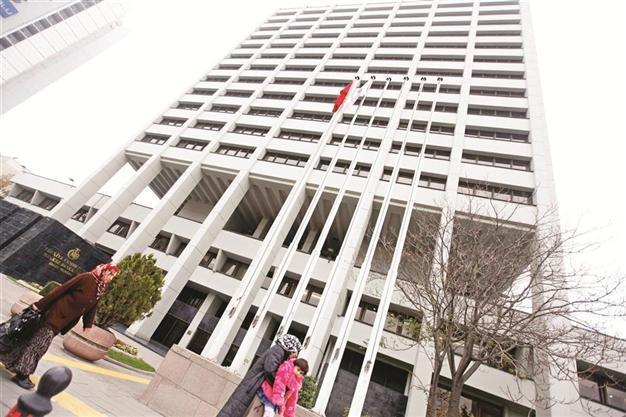Turkish Central Bank soothes panic over uncertainty
GİRESUN - Reuters

Turkey’s Central Bank headquarters in Ankara is seen. About $8 billion has flowed out of Turkish markets since the beginning of May, Gov Başçı says. REUTERS photo
The Turkish Central Bank sees no current need to raise the upper band of its interest rate corridor, Gov. Erdem Başçı said yesterday, despite heavy outflows of money over the last month.
Turkish markets have been hit by uncertainty over the outlook for U.S. Federal Reserve money-printing policies and by anti-government protests across Turkey, prompting the central bank to support the lira on June 11.
About $7.9 billion to $8 billion has flowed out of Turkish markets since the beginning of May, mainly from money markets, Başçı told a conference in the Black Sea town of Giresun. The central bank’s Monetary Policy Committee holds its monthly rate-setting meeting on June 18.
“We will discuss an increase in the upper band of the interest rate corridor in the MPC, but as of now there does not appear to be any such need,” Başçı said.
He said a third of the outflows from the lira and bonds were due to domestic factors and the remainder due to global factors.
At its last meeting on May 16, the bank cut all its key rates by 50 basis points, which left the overnight borrowing rate at 3.5 percent, the benchmark repo rate at 4.5 percent and the lending rate at 6.5 percent.
HSBC Asset Management strategist Ali Çakıroğlu said there were no significant messages in Başçı ‘s comments that would move markets, but they indicated that the bank would retain its flexible policy stance.
“We think capital inflows/outflows will be significant in the central bank’s monetary policy decisions,” Çakıroğlu said, adding that he expected the current policy stance to be maintained at next week’s MPC meeting.
Growth expected to pick upEconomic growth, which was 3 percent year-on-year in the first quarter, is expected to pick up in the second quarter and inflation will start to fall from August after rising in June and July, partly due to base effects, Başçı said.
He added that Turkey’s current account deficit was in line with forecasts in the government’s medium-term programme and was expected to rise gradually to $60 billion this year. Last year it narrowed 37 percent to $48.9 billion.
This large deficit is a headache for Turkey as it makes the country more of a net debtor to the rest of the world and means it must keep up demand for its own currency, such as by having high interest rates, which in turn hurt domestic businesses.
The public debt-to-gross domestic product ratio (GDP) may fall below 35 percent this year from 36 percent in 2012, he said.
The real effective exchange rate in June will be significantly below 120, a level above which the bank has previously said it would consider rate cuts, Başçı added, giving the bank leeway to hold interest rates steady or raise them.
